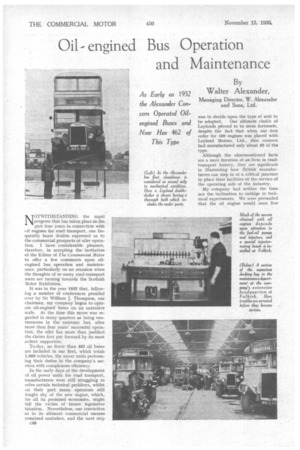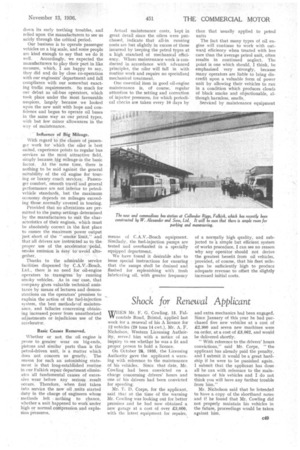Oil engined Bus Operation and Maintenance
Page 106

Page 107

If you've noticed an error in this article please click here to report it so we can fix it.
As Early as 1932 the Alexander Concern Operated Oilengined Buses and Now Has 462 of This Type By Walter Alexander,
Managing Director, W. Alexander and Sons, Ltd.
NOTWITHSTANDING the rapid progress that has taken place in the past four years in connection with oil engines for road transport, one frequently hears doubts expressed as to the commercial prospects of oiler operation. I have considerable pleasure, therefore, in accepting the invitation of theEditor of The Commercial Motor to offer a few comments upon oilengined bus operation and maintenance, particularly on an occasion when the thoughts of so many road-transport users are turning towards the Scottish Motor Exhibition.
It was in the year /932 that, following a number of conferences presided over by Sir William J. Thompson, our chairman, my company began to operath oil-engined buses on an extensive scale. At the time this move was regarded in many quarters as being venturesome in the extreme; but, after more than four years' successful operation, the oiler has more than justified the claims first put forward by its most ardent supporters.
Today, no fewer than 462 oil buses are included in our fleet, which totals 1,069 vehicles, the newer units performing their duties in the company's services with conspicuous efficiency.
In the early days of the development of oil power units for road transport, manufacturers were still struggling to solve certain technical problems, whilst on their part many operators still fought shy of the new engine, which, for all its promised economies, might fall the victim of future legislative taxation. Nevertheless, our conviction as to its ultimate commercial success remained unshaken, and the next step c48 was to decide upon the type of unit to be adopted. Our ultimate choice of Leylands proved to be most fortunate, despite the fact that when our first order for 100 engines was placed with Leyland Motors, Ltd., that concern had manufactured only about 50 of the type.
Although the aforementioned facts are a mere iteration of an item in roadtransport history, they are significant in illustrating how British 'manufacturers can step in at a critical juncture to place their facilities at the service of the operating side of the industry.
My company had neither the time nor the inclination to indulge in technical experiments. We were persuaded that the oil engine would soon live
down its early teething troubles, and relied upon the manufacturers to see us safely through the critical period.
Our business is to operate passenger vehicles on a big scale, and some people are kind enough to say that we do it well. Accordingly, we expected the manufacturers to play their part in like measure, which, I am happy to say, they did and do by close co-operation with our engineers' department and full compliance with our somewhat exacting traffic requirements. So much for our debut as oil-bus operators, which took place under the most favourable auspices, largely because we looked upon the new unit with hope and confidence and began to operate oil buses in the same way as our petrol types, with but few minor allowances in the way of maintenance.
Influence of Big Mileage.
With regard to the classes of passenger work for 'which the oiler is best suited, experience points to regular bus services as the most attractive field, simply because big mileage 'is the basic factor. At the same time, there is nothing to be said against the general suitability, of the oil engine for touring or luxury coach services. Passenger comfort,. smooth travel and general performance are not inferior to petrolvehicle standard's, but the maximum economy depends on mileages exceeding those .normally covered in touring.
Provided that no alterations are permitted to the pump settings determined by the manufacturers to suit the characteristics of their engines, which must be absolutely correct in the first place to ensure the maximum power output just short of the ".smoke limit," and that all drivers are instructed as to the proper use of the accelerator pedal, smoke emission is easy to avoid altogether.
Thanks to the admirable service facilities dispensed by C.A.V.-Bosch, Ltd., there is no need for oil-engine operators to .transgress by running smoky vehicles. As in our case, that company gives valuable technical assistance by means of lectures and demonstrations on the operators' premises to explain the action of the fuel-injection system, the best methodsrof maintenance, and fallacies concerning obtaining increased power from unauthorized adjustments or injudicious use of the accelerator.
Basic Causes Removed.
Whether or not the oil engine is prone to greater wear on big-ends, pistons and similar parts than is the petrol-driven unit, is a matter which does not concern us greatly. The reason for such an astonishing statement is that long-established routine in our Falkirk repair department eliminates all fundamental causes of excessive wear before any serious result occurs. Therefore, when first taken into service the new oil ,units started duty in the charge of engineers whose methods left nothing to chance, whether a unit happened to work under high or normal compression and explosion pressures. Actual maintenance costs, kept in great detail since the oilers were purchased, indicate that all-in running costs are but slightly in excess of those incurred by keeping the petrol types at a high standard of mechanical efficiency. Where maintenance work is conducted in accordance with advanced principles, the oiler will fall in with routine work and require no specialized mechanical treatment.
One essential item in good oil-engine maintenance is, of course, regular attention to the setting and correction of injector pressures-, for which periodical checks are taken every 10 days by
means of C.A.V.-Bosch equipment. Similarly, the fuel-injection pumps are tested and overhauled in a specially equipped department.
We have found it deSirable also to issue special instructions for ensuring that the sumps shall be drained and flushed for replenishing with fresh lubricating oil, with greater frequency than that usually applied to petrol units
The fact that many types of oil engine will continue to work with outward efficiency when treated with less care than the average petrol unit, often results in continued neglect. The point is one which should, I think, he emphasized very strongly, because many operators are liable to bring discredit upon a valuable form of power unit by allowing their vehicles to run in a condition which produces clouds of black smoke and objectionable, although harmless, smells,
Serviced by maintenance equipment
of a normally high quality, and subjected to a simple but efficient system of works procedure, I can see no reason why any operator should not derive the greatest benefit from oil vehicles, provided, of course, that his fleet mileages be sufficiently high to produce adequate revenue to offset the slightly increased initial costs.








































































































































































